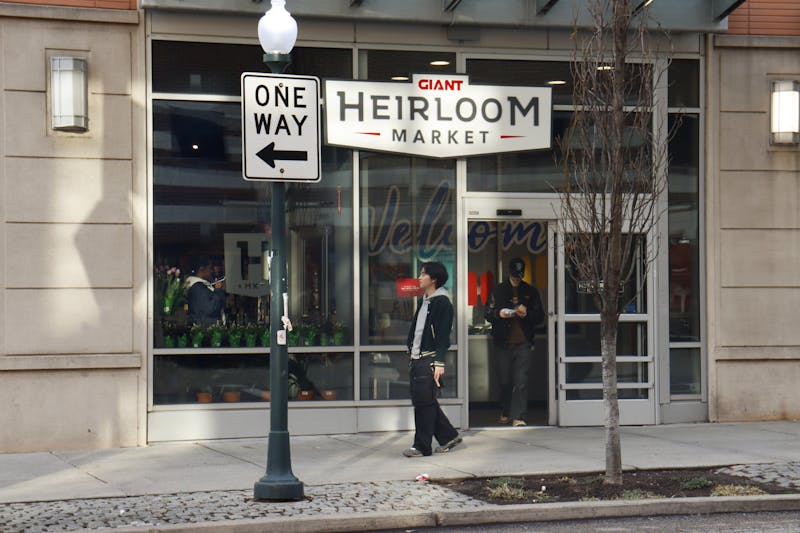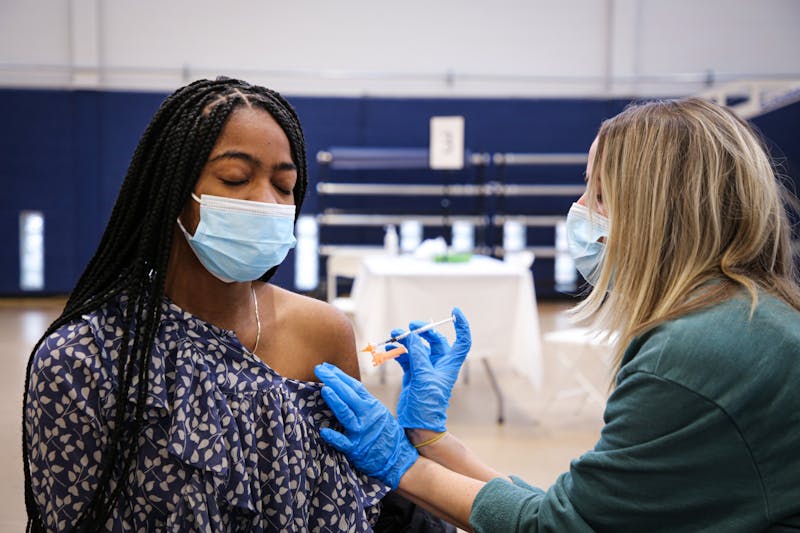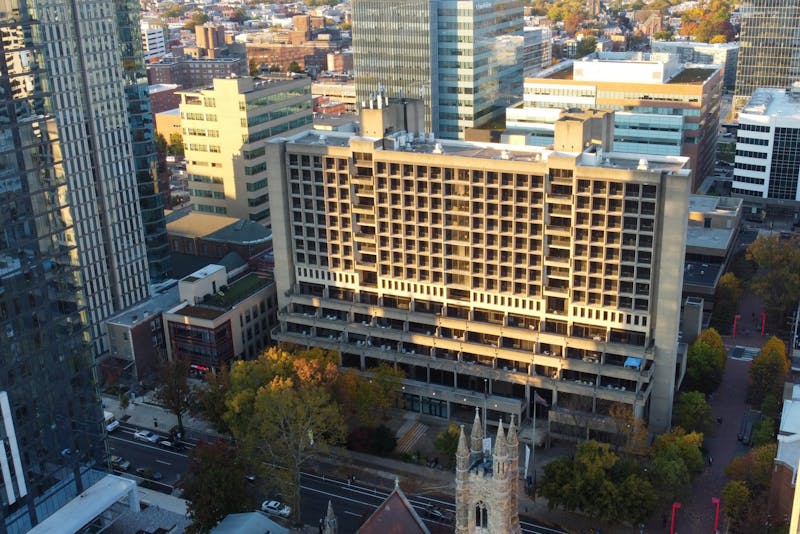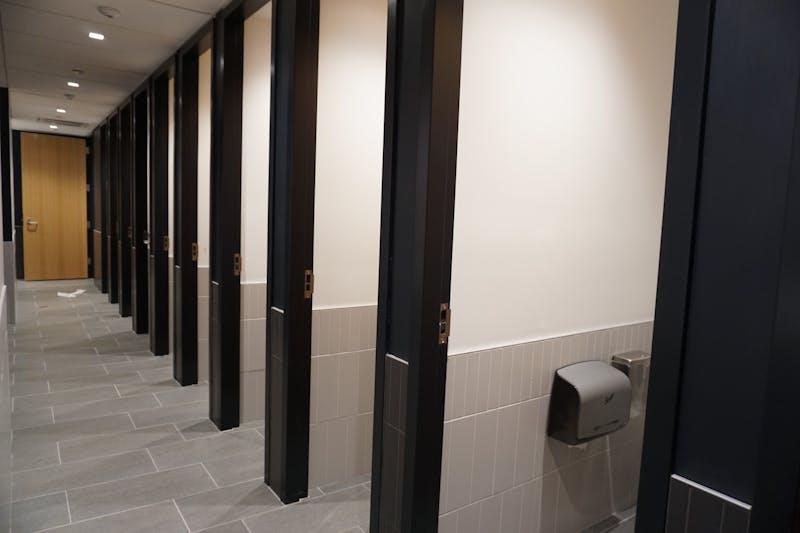
Students dine at Hill Dining Hall on Jan. 31.
Credit: Weining DingOne year after two Penn Dining locations were found to have violated city health code, students continue to report concerns — including a cockroach, a maggot, and a piece of glass found in their food.
These most recent instances — described by three separate students — have all occurred this month. On Jan. 14, Wharton sophomore Alison Yau discovered a roach in her food at 1920 Commons. Four days later, on Jan. 18, Wharton first-year Jamie Kim — who is also a reporter for The Daily Pennsylvanian — found a piece of glass in her pasta from Penn Pi at Houston Hall.
In addition, on Jan. 23, an image was circulated on the anonymous social network Sidechat showing a maggot on a piece of broccoli in 1920 Commons. The DP was unable to verify the image or reach the poster of the image for comment.
Residential District Manager for Bon Appétit Management Company Bill Hess told the DP that Penn Dining staff immediately followed up to discern how these events might have occurred. Beyond additional checks being added to Penn Dining’s processes, Hess said that Penn Dining is reviewing its procedures with produce suppliers and cleaning and inspection companies to identify any areas for improvement.
Penn Dining’s pest control company verified that there has not been any bug sighting at Commons during its most recent checks. Penn Dining also confirmed that there is no glass at the station at Penn Pi or in Houston Hall’s kitchen.

Three students found a cockroach, a maggot and a piece of glass in food served at Penn dining facilities (Photos from Alison Yau, Sidechat, and Jamie Kim).
In response to the maggot being found in the broccoli, Bon Appétit staff consulted with Penn’s corporate food safety team and brought up the incident to the campus supply chain partners, according to Hess. He added that staff is closely monitoring the produce-washing process.
Penn Dining staff have been and will continue to be extra vigilant when thoroughly cleaning produce since fresh ingredients are used, rather than frozen or canned ingredients, according to Hess.
Hess also emphasized that — in the event that an issue still takes place — it is critical to immediately bring it to the attention of the dining team member. He said that Penn Dining was not able to determine the cause of these three incidents, particularly since none of the students reached out to a manager or a Penn Dining staff member directly.
“Having only a photo to go on limits our ability to investigate these concerns,” Hess said. “In all of these instances, staff were not made aware of the problems at the time they happened, which makes investigating the issues far more challenging.”
Yau — in contrast with Hess's remarks — told the DP that she talked to the manager present at Commons upon seeing the roach. The next day, Director of Residential Dining Steven Green emailed her an apology and refunded her a meal swipe.
“I want you to know we’re actively working to address this issue with the goal being this never happening again,” Green wrote in the email, which Yau shared with the DP.
But Yau said that she felt the apology was similar to ones from previous years.
“The fact that I’m not shocked by it kind of shows that there’s already some kind of existing issues that are pretty publicly made about the dining halls,” Yau said.
Yau also criticized the mandatory dining requirement for first-year and sophomore students, describing it as a “cash grab.”
“It’s not even like we’re expecting super high quality food,” Yau said. “It just needs to meet basic government quality and health standards, and it doesn’t even seem to do that.”
In response to Yau’s experience, an online petition with the picture of the roach was created and currently has 358 signatures.
“The call to action is clear: the University of Pennsylvania must prioritize the immediate overhaul of its dining services to ensure the health, satisfaction, and well-being of its students,” the petition read.
The petition alleges that many students have experienced “foodborne illnesses and continuous gastrointestinal distress” from eating at Penn’s dining halls. A Wharton student told the DP last year he experienced suspected food poisoning shortly after he ate a burger at Hill.
“That’s the bigger concern, underpinning all of this — sickness,” Yau said. “You can’t expect people to pay upfront for a dining plan and then again have to front their own money when they realize that the food could potentially make them physically ill.”
College first-year Chris Tyburski, who said he was present when the piece of glass was found, shared similar disappointment.
“Dining hall food is one of the biggest factors that can contribute to quality of life here, [and] I think it is certainly something that could use a strong look at for improvement,” Tyburski told the DP. “The state of the dining when I got here is one thing, but I would say the improvements — or lack thereof — would be a lot more indicative of my feelings about the trust I have for the University.”
Hess said that Penn Dining is committed to rectifying these issues moving forward.
“The most important thing students can do is if they encounter incidents, especially those involving health and safety, is to bring them to the immediate attention of staff so we can identify the source of the issue and immediately take appropriate corrective action,” Hess said. “Students should know that we take reports such as these seriously.”
The news follows Penn Dining’s announcement last February that they would be implementing a new action plan for meeting health and safety regulations in the campus dining facilities after there were a total of 100 observations of violations of the Philadelphia health code.
The violations particularly targeted Hill and Commons, which the DP first reported were found to not be in compliance with the Philadelphia health code.
The Daily Pennsylvanian is an independent, student-run newspaper. Please consider making a donation to support the coverage that shapes the University. Your generosity ensures a future of strong journalism at Penn.
Donate












